

Nutrition and Anxiety. Nutrition and Bipolar Disorder. Meat Only Diet for Depression and Anxiety. The Pursuit of Happiness. Meat, Organs, Bones and Skin. Your Brain on Plants: Micronutrients and Mental Health - Diagnosis:Diet. Plant-Based Diets, Micronutrients and Mental Health Do vegetarian and vegan diets contain the micronutrients our brains need to function properly?
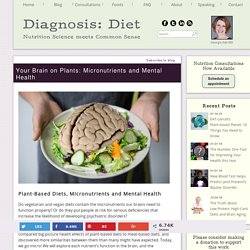
Or do they put people at risk for serious deficiencies that increase the likelihood of developing psychiatric disorders? Evolutionary Psychiatry: Diet and Mood Disorders. Found two more studies measuring diet pattern and mood disorders!
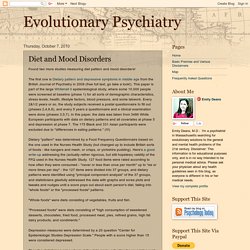
The first one is Dietary pattern and depressive symptoms in middle age from the British Journal of Psychiatry in 2009 (free full text, go take a look!). This paper is part of the large Whitehall II epidemiological study, where some 10,000 people were screened at baseline (phase 1) for all sorts of demographic characteristics, stress levels, health, lifestyle factors, blood pressure, and some labwork. Every 2&1/2 years or so, the study subjects received a postal questionnaire to fill out (phases 2,4,6,8), and every 5 years a questionnaire and a clinical examination were done (phases 3,5,7).
In this paper, the data was taken from 3486 White European participants with data on dietary patterns and all covariates at phase 5 and depression at phase 7. The 175 Black and 331 Asian participants were excluded due to "differences in eating patterns. " (!!!) Eat Fruits and Vegetables Daily for Mental Health? Good Mood Foods: How Diet Affects Happiness - Blue Zones. Lani Muelrath is a bestselling author, speaker, and TV host known for her expertise in plant-based, active, mindful living.

This article is adapted from her newest book, The Mindful Vegan, a 30-day plan for shedding old thinking patterns and living more joyfully with food. If you are presently piling plenty of colorful plants on your plate, you are already at a better mood advantage. Research tells us that plant-based diets are associated with healthier mood states.
The more fruits and vegetables people eat, the happier, less depressed, and more satisfied they are with their lives. Today, we’ll focus on how, grounded in your biochemistry, eating more plants and eliminating animals and their products from your diet creates greater mental well-being and resilience. Plantified Plate = Mood Elevator Up A recent study of nearly one thousand men and women examined the mood impact of obtaining dietary antioxidants. Study after study corroborates. Can Cutting Meat Improve Your Mood? 1. 3 Ways Sugar Is Ruining Your Mental Health. NAC Helps Mental Health Problems. Nutrients Help Depression, Anxiety, Mental Health. How Your Diet Controls Your Mood. Feeling down in the dumps?

Your late lunch may to be blame. By April benshosan Wondering why you’ve been feeling groggy, deep in the dumps, or unusually energized? Recalling your last meal can actually help you uncover the secrets behind your shifting moods. 8 Ways Eating Better Can Improve Your Mental Health. I walked into my apartment to find my roommate sitting on the couch with her head in her hands.
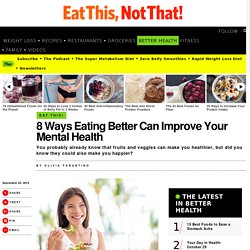
She looked as if she had reached a breaking point. "Another tough day at work? " I asked her. "Not really. " She sighed as she reached for what looked like a day-old carton of fast food fries. I bit my tongue from reminding her (again) that what you eat actually plays an important role in how you feel mentally. Although French fries and ice cream often make it on the list of grub to dig into when we're down, true comfort food comes from a healthier crowd. 11 Foods That End Bad Moods. Mood-Boosting Foods: 7 Foods for Greater Happiness.
The healthiest mood-boosting foods might not always be the first thing on your mind when you find yourself diving into a bowl of ultra-processed foods like greasy chips or crispy fried chicken.
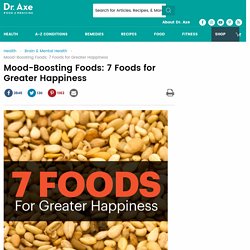
These foods may temporarily taste amazing but often leave you feeling less-than-awesome afterward. It’s our biology. Our brains are wired to turn to food to feel better. And the food industry knows how to play us. (At least it tries to by adding some of the worst ingredients into our foods.) Our bodies actually respond to different types of foods in different ways. Luckily, there are others that can actually improve our moods. Feeling blue? 13 Mood-Boosting Snacks. No one feels that great after face-planting into a Costco-sized box of Oreos, but it turns out that the mood swings and anxiety we feel go a lot deeper than food guilt.

For example, low blood sugar has been tied to depression, whereas healthy fats have been shown to help mitigate stress. So, while we love rolled ice cream just as much as the next person, there's no doubt that there's now all the more reason to replace processed junk with fresh produce and healthy snacking options. Here's a look at exactly what to load up on—and be sure to start skipping these 15 Foods That Make Your Depression or Anxiety Worse!
20 Foods That Put You in a Bad Mood. There’s a reason Hippocrates said, “Let your food be your medicine and your medicine be your food.”

Not only is there a relationship between what you consume and your physical health, there’s a direct line to your mental and emotional health as well. Simply put? That grumpiness you feel when you overindulge in your gastronomic vices goes way beyond mere food guilt. It’s important to remember, however, that it’s a two-way street: Foods directly influence our brain chemistry (even if only temporarily), but moods also influence food choices—which is why understanding what different foods do for you is an important part of leading a healthy lifestyle. We turned to leading health experts to find out which foods lead to plummeting moods, anxiety, and troubled sleep. If you’ve spent more than a few minutes on EatThis.com, you’ll know how anti-soda we are.
50 Foods That Make You Happy. Evolutionary Psychiatry: Mental Health and Omega 3/6 Ratio, A New Review. Twitter is a black hole for time spitting out information like Hawking radiation.
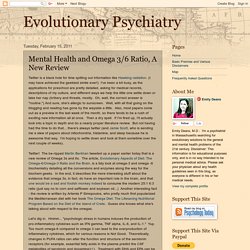
(I may have achieved the geekiest simile ever!) Your Brain on Omega 3: Balancing the O3 to O6 Ratio. Source: Wikimedia Commons The fats we eat come in all sorts and sizes, from polyunsaturated to saturated, long, medium, short chain and sterols.

Each of these categories of fats plays a role in our bodies, from calorie source to energy storage to hormones, and even as signaling molecules sending messages back and forth between the cells of the brain, the endocrine system, and the immune system. Mental health researchers have long been interested in the role of the long chain omega 3 fatty acids found in fish oil, for example, as it is so prevalent in our brains. In recent years, with the advent of processed food and widespread use of vegetable oils, the amount of omega 3 and omega 6 fatty acids we are eating changed from a relatively equal amount to a hugely skewed ratio in favor of omega 6. Why does this matter? Now both omega 3 and omega 6 fatty acids are stored in cell membranes. Mood stabilizers such as anti-epileptic drugs are used to treat bipolar disorder and migraines as well. Brain Fertilizer. Source: wikimedia commons While it’s commonly believed that clinical depression and other mental health disorders are caused by a “chemical imbalance,” we’ve known for a long time that’s simply not true.
There’s now a good deal of evidence that mental health problems are caused by a combination of environmental stressors (such as trauma, infections, brain injury, and lack of sleep) and genetic risk. In the case of clinical depression or anxiety, various stressors lead to chronic over-activation of the sympathetic “fight-or-flight” nervous system and eventually to cortisol resistance, brain inflammation, and a decreased ability of the cells in certain areas of the brain to work efficiently, and a decreased ability of those cells to recover and repair from their daily work. It’s not a lack of serotonin or “chemical imbalance” that causes the problem, it’s an overactive stress response and inability to turn the fight or flight system off. Copyright Emily Deans MD. Your Brain on Folate.
The latest psychiatry journals are absolutely hopping with trials of folic acid and its downstream metabolite, methylfolate. We have this article from AJP (link is external), this one from JAMA Archives (link is external), along with these (link is external) two (link is external) from the Journal of Clinical Psychiatry. We’ve got multiple formulations of folates tested, considerations of genetic risk, multiple brain conditions…it’s a B vitapalooza in the psychiatric world these days, but what does it all mean? In order to answer the question of what folate has to do with depression, we’re going to need several blog posts. But we have to start with the basics, so buckle up for some biochemistry. Folates (otherwise known as versions of vitamin B9) play a number of roles in the body and brain.
Here we have folic acid: Source: wikipedia This is the pure molecule found in supplements and in supplemented grains. Source: Emily Deans copyright Emily Deans MD.